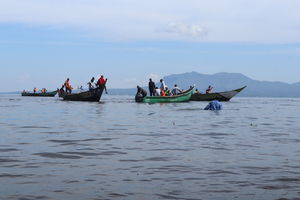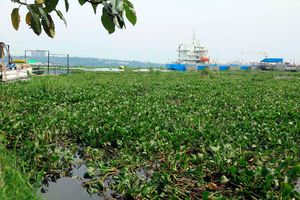Researchers propose new strategy to combat Lake Victoria’s pollution

A section of Lake Victoria in Kisumu City on July 6, 2023. The freshwater lake is facing pressure due to encroachment, pollution, abstraction of water, invasive species, weeds, and climate change.
What you need to know:
- Last year, tens of fish farmers in sections of Lake Victoria incurred losses worth millions of shillings, pushing the county alongside Kenya Marine and Fisheries Research Institute (KMFRI) to test the water to investigate cause of the massive deaths of fish.
- KMFRI Director of Fresh Water Systems Research Christopher Aura said the fish died due to oxygen deficiency.
Environmental experts have called for extensive tree-planting on riparian lands surrounding Lake Victoria to reduce pollution and safeguard the lake’s ecosystem.
The proposed afforestation efforts aim to curb soil erosion, filter pollutants and restore natural habitats, addressing the escalating environmental challenges threatening one of Africa’s largest freshwater lakes.
As concerns over water quality and biodiversity loss grow, the experts say the proposal follows research findings which showed that some rivers emptying into the lake have high nutrient loading, resulting in harmful algae bloom.
According to Mr Enock Orina, a research student at Kenyatta University, previous research has shown that nutrients emanating from the agriculture sector often find their way into the rivers and later drain into the lake.
Mr Orina said planting tress in riparian lands will help absorb nutrients and reduce water pollution. “Riparian lands should be maintained with indigenous trees to filter the nutrients loading into the aquatic ecosystem,” said Mr Orina.
The researcher said rivers surrounded by agricultural lands are likely to have high nutrient loading into the aquatic environment compared to forested areas.
He laid emphasis on the need for assessment of emerging contaminants since they have direct and indirect impacts on human health. “Studies also need to be conducted to assess the impact of nutrient loading into coral reef ecosystems at large in marine environments,” he said. Mr Orina was speaking at the second Aquatic Resources and Blue Economy Conference held in Kisumu from June 18 to 21.
During the event, the Kenyatta University student presented his research findings on the effects of pollution in River Awach Kaspul, which drains into Watch Kibuon and empties its water into Lake Victoria. The study , he said, aimed to assess the impact of different agricultural land uses on nutrient loading into the rivers draining waters into Lake Victoria.
“We also wanted to determine total nitrogen and phosphorus, hardness, ammonium, nitrates, nitrite, silicate and alkalinity at each sampling point in the river,” said Mr Orina. He worked in eight sampling sites, which were under investigations from October 2023 to March 2024. The study, according to Mr Orina, revealed that ammonia and nitrogen levels at different points in the sampling site exceeded the limits given by the National Environment Management Authority .
Last year, tens of fish farmers in sections of Lake Victoria incurred losses worth millions of shillings, pushing the county alongside Kenya Marine and Fisheries Research Institute (KMFRI) to test the water to investigate cause of the massive deaths of fish.
KMFRI Director of Fresh Water Systems Research Christopher Aura said the fish died due to oxygen deficiency.
“The thick layer of algal blooming at the site was a sign of increased water pollution whose decomposition may have lowered dissolved oxygen levels.”





